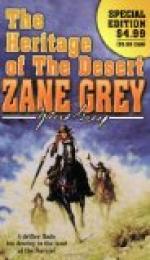The two long years of his desert training were as an open page to Hare’s unveiled eyes. The life he owed to August Naab, the strength built up by the old man’s knowledge of the healing power of plateau and range—these lay in a long curve between the day Naab had lifted him out of the White Sage trail and this day of the Mormon’s extremity. A long curve with Holderness’s insulting blow at the beginning, his murder of a beloved friend at the end! For Hare remembered the blow, and never would he forget Dave’s last words. Yet unforgetable as these were, it was duty rather than revenge that called him. This was August Naab’s hour of need. Hare knew himself to be the tool of inscrutable fate; he was the one to fight the old desert-scarred Mormon’s battle. Hare recalled how humbly he had expressed his gratitude to Naab, and the apparent impossibility of ever repaying him, and then Naab’s reply: “Lad, you can never tell how one man may repay another.” Hare could pay his own debt and that of the many wanderers who had drifted across the sands to find a home with the Mormon. These men stirred in their graves, and from out the shadow of the cliff whispered the voice of Mescal’s nameless father: “Is there no one to rise up for this old hero of the desert?”
Softly Hare slipped into his room. Putting on coat and belt and catching up his rifle he stole out again stealthily, like an Indian. In the darkness of the wagon-shed he felt for his saddle, and finding it, he groped with eager hands for the grain-box; raising the lid he filled a measure with grain, and emptied it into his saddle-bag. Then lifting the saddle he carried it out of the yard, through the gate and across the lane to the corrals. The wilder mustangs in the far corral began to kick and snort, and those in the corral where Black Bolly was kept trooped noisily to the bars. Bolly whinnied and thrust her black muzzle over the fence. Hare placed a caressing hand on her while he waited listening and watching. It was not unusual for the mustangs to get restless at any time, and Hare was confident that this would pass without investigation.
Gradually the restless stampings and suspicious snortings ceased, and Hare, letting down the bars, led Bolly out into the lane. It was the work of a moment to saddle her; his bridle hung where he always kept it, on the pommel, and with nimble fingers he shortened the several straps to fit Bolly’s head, and slipped the bit between her teeth. Then he put up the bars of the gate.
Before mounting he stood a moment thinking coolly, deliberately numbering the several necessities he must not forget—grain for Bolly, food for himself, his Colt and Winchester, cartridges, canteen, matches, knife. He inserted a hand into one of his saddle-bags expecting to find some strips of meat. The bag was empty. He felt in the other one, and under the grain he found what he sought. The canteen lay in the coil of his lasso tied to the saddle, and its heavy canvas covering was damp to his touch. With that he thrust the long Winchester into its saddle-sheath, and swung his leg over the mustang.




